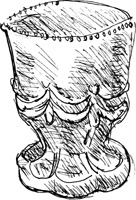


Caesar was an opportunist who came late to the game. His was a life of adventure, hardball politics, and terrifying wars. He slayed a million foes and got with every Woman in the Empire and plenty of men, too, if you believe everyone. He borrowed mad amounts of money, forged alliances, escaped from pirates, dodged murderers, stole insane amounts of booty, wrote books about himself, invented letter writing, had a baby with the wily Queen of Egypt, Cleopatra, wore thigh-high red boots and a red cape and was rubbed out by rivals who thought he had too much power and was riding too high in his pleated brass skirt. And he died as he lived, burning with ambition.
His name is a title—czar and kaiser are later incantations—and his legacy is scattered wide across our culture: his haircut, his month (July), his salad, the phrase “I came, I saw, I conquered,” his rep as a master politician, his bloody murder. We Americans even hold a connection to Caesar in our pockets, as our money has an eagle holding a bunch of arrows. Caesar would easily recognize this emblem (and he would have loved to have had predator drones).
A fasces is a bundle of birch rods with an axe or two stuck in. In Rome important magistrates had their underlings, or lictors, carry these as symbols of their power as they proceeded through town. The axes stood for the power of life and death.
The eagle, or aquila, was carried by every Roman legion and was a symbol of strength and domination. But America’s eagle did it best. Because we say we did.
Gaius Julius Caesar was born to an illustrious family who claimed to be descended from the goddess Venus—so there’s that insanity. His mother, Aurelia, raised him in a modest apartment in Subura, which is where we get the word suburb. His aunt Julia married Marius, a legendary figure in Rome for his feats as a general and as the man who let the poor into the army.
Julius barely made it through his youth without getting the boom lowered. Sulla, Marius’s chief rival, spared young Julius only at the pleading of relatives and the Vestal Virgins. It would not be the only time the goddess Fortune favored him. Sulla was wary and said of Caesar, “I see many a Marius in him.” He would go on to surpass the greatness predicted.
Caesar served as a young officer in Turkey where, according to rumor, he also served the king as a young boy toy. He won laurels, which he dug, as his hair was already thinning and they helped hide it. He also combed his hair forward to compensate, a style that would become known as a Caesar, which Napoleon later copied.
While sailing to Rhodes, he was captured by pirates. Their chief goal was ransom. While captive, he socialized and read them verses, and when the pirates didn’t understand them, he told them they were barbarians, reminding them that when he was free, he would come back and have them executed. By crucifixion. When the ransom was delivered, he changed his mind and slit their throats first, out of mercy; Caesar didn’t shilly-shally.
He joined up with Rome’s most famous general, Pompey the Great. Pompey married Caesar’s daughter, making Caesar Pompey’s father-in-law even though he was younger. Creepy and useful. Rich Women in Rome were often married and divorced for social movement. Caesar and Pompey brought in Crassus, who was wildly rich, and formed the first Triumvirate.

Caesar needed gravity, a great deed, something to make people stop thinking he was a jumped-up tart with a receding hairline. Gaul, or France, was a plum with advanced agriculture, great goods, and hundreds of sophisticated tribes of people, though like any dominant culture, the Romans thought anyone foreign was a barbarian. He sure enough brought home the big baguette. Hard-assing the locals and looting everything, he built a fortune in France. All the while he dictated his exploits, sometimes on horseback, to secretaries. This book survives as The Gallic Wars; it is mostly about how great he is.
THE VESTAL VIRGINS
The Vestal Virgins had the distinction of being the only Women in Rome who were not completely controlled by their fathers. They strode around town awesomely proceeded by lictors carrying fasces. Messing with the Virgins meant instant death; they were noble-born girls who were chosen for their physical perfection to perform religious duties and keep all the wills of Rome because they were incorruptible. Although their lives were prescribed by men, they had more autonomy than any Women in Rome.
Caesar’s relations with his troops are key in his tremendous military success. On campaign they were “comrades” and always got huge bonuses. He occasionally let the troops sack a place and rape and pillage, to keep them happy. He knew names, ate camp food, and marched with the men. They knew he chased Women and that he had random epileptic attacks; for that they loved him.
After a great victory against the Gaul armies, he turned his army back to Rome, but the Senate forbade him to come back in triumph. He was a fame whore now and knew what had to be done. He crossed the River Rubicon with the whole force.
“The die is cast,” said he. Caesar loved gambling; this time he rolled the bones for the whole focaccia: Rome and the Empire.
THE TRIUMPH
The Roman triumph was in effect a giant parade/rally/banquet meets religious festival. Legions sang bawdy songs about how Julius was man to every wife and wife to every man. But the lines that really paint a picture is this tasty lyric: “Romans, watch your wives, see the bald adulterer’s back home, You fucked away in Gaul the gold you borrowed here in Rome.” Girls strewing flowers, captives in chains, exotic wild animals from captured lands, wagons full of gold, statues, treasure, giant paintings on floats depicting battles, lists of territories taken and enemies slain. This PR sometimes backfired as Cleopatra’s half sister, Arsinoe, was forced to march in chains in the African triumph, and she was so young and lovable, the crowd wept. Certainly Cleopatra killed herself in part to be spared marching in submission through Rome as part of the triumph of Augustus (Caesar’s adopted nephew and eventual successor).
Rome was always of two minds about Caesar. The populace adored him, but the Senate was never too sure about him. Cicero vilified Caesar’s best friend Marc Antony, for which he paid by having his eloquent tongue poked through with a needle.
The Senate decided to deal with Caesar’s power grab by throwing yet another Roman civil war led by Pompey, who had a huge army of Romans and client states bankrolled by the Senate. Cato, who hated Caesar for having an affair with his sister, Servilia, and other leading lights were already cocksure of victory. Their tents were laid with ivy and silver plates as they prepared for the victory banquet, but Caesar was having none of it. He snatched a ridiculously quick victory against the huge force, and Pompey was forced to don a disguise and escape to Alexandria.
Caesar gave chase all the way to Egypt, but the Egyptians—thinking they were doing him a solid—killed Pompey and presented Caesar with the head. Caesar wept and was revolted because he had loved Pompey but was probably doing a secret victory dance as he was spared having to kill his old partner and former son-in-law.
While in Alexandria, Caesar received another present—a laundry bag holding a nubile young lady. Specifically, the daughter of the dead king and wife and sister of the new king, Ptolemy. This would be the canny, seductive, smart as a whip, and ruthless-as-the-century-she-was-born-in Cleopatra. She needed and wanted Rome on her side and wasted no time in making this happen with Caesar.
War broke out and Caesar, with his small force, set fire to the Egyptian fleet. The fire spread and Caesar, recognizing a partner with ambitions as outsized as his, moved his chips all in and placed Cleopatra on the throne. Though first he had to clear out some space. Setting fire to the Egyptian fleet moved things along nicely. Sadly, the fire burned part of the library at Alexandria, the most famous repository of knowledge, books, inventions, artwork, and halls of learning in the ancient world. But a small price to pay for getting the throne for your girlfriend.
They took an intimate, monthlong honeymoon cruise down the Nile. No matter that he was technically still married back in Rome. Caesar grooved on the swirling incense and the scantily clad dancing girls, the endless finery, and the strange animal gods. In comparison, Rome was so businesslike, as were her gods. Cleopatra bore him a son, Caesarion, and he gave her three legions to guard her new kingdom. With Egypt under control with a new Roman puppet ruler—lover and mother of his son—Caesar left for Turkey to deal with the errant King Pharnaces.
The victory was so swift and decisive, he sent the Senate the message “Vini, vidi, vici”: “I came, I saw, I conquered.” In the triumph over this kingdom, he had this laconic placard displayed instead of action scenes of his win.

Caesar returned to Rome from his campaigns and threw a bitching party and gave himself four lavish Triumphs, as well as a bonus to everyone in Rome. No wonder the common folks loved him.
Caesar was elected dictator perpetuo, which means exactly what you think it does. He forgave his rivals and handed out money from his vast fortune. He made colonials into Roman citizens and—shock, horror—let Gauls into the Senate. Big hairy foreigners that of course spoke Latin and owed him their gig. He was wearing a gold crown now and high red boots; he claimed it was an ancient fashion play. Everyone else thought he was being campy. Cleopatra had been brought over with her son, his son, and was partying with important visitors at his crib outside of town. The month July was named for him. In the Senate plans began in secret to kill him for the good of the state. Because no one can stand a winner in thigh-high red boots.
Cassius and Brutus, the rising young star of the Senate, were the main plotters. They decided to grab him in the Senate and do the deed there. They called their band the Liberators.
At a dinner party the topic came up: What is the best way to die? Which death is best? Caesar jumped in before anyone had digested the question. “Unexpected” was his reply. He was determined to be the sexiest emperor, and he certainly took that cake.
He had every warning about his fate. A soothsayer warned him about going out on March 15, the Ides of March. When the day came, he was called to the Senate and met by a senator, Cimber, who grabbed Caesar and pulled down his tunic. Caesar now knew what was going on. He shouted, “Why, this is violence.” Casca raised his dagger, but Caesar caught his arm. Then the Liberators were on him, daggers unsheathed from the leather pouches where they kept their styluses. Caesar tried to fight back but was overwhelmed. He caught sight of Brutus and said, “You too, my son?” A figure of speech. Caesar’s favorite mistress was Brutus’s mother, Servilia, but it is most likely Brutus was not his son. Just a moralistic, idealistic rich kid who was going to solve Rome’s problem in the traditional way: assassination. The Liberators ran into the streets yelling, “Rome is free.” But the streets were empty. Finally, some slaves wrapped Caesar up and carried him off, where by all accounts the first recorded autopsy was performed. The doctor declared he had been stabbed twenty-three times, but only the second blow was fatal.
In the name of freedom and the republic, the Liberators had murdered Caesar. But in the end, his death finished the Republic for good. Caesar’s dream of total power and empire was his last bequest to his rivals and his friends. At least we still have the eagle.